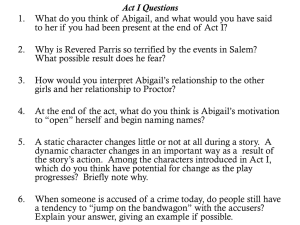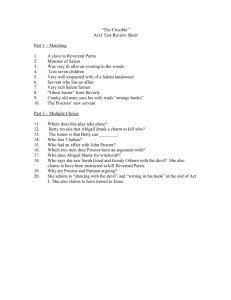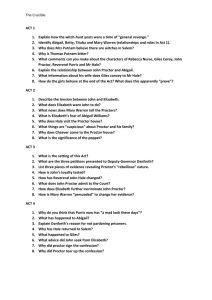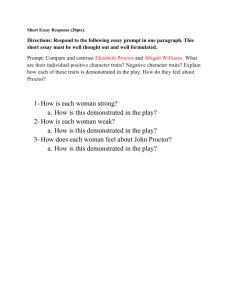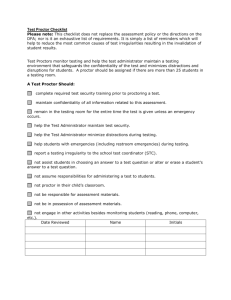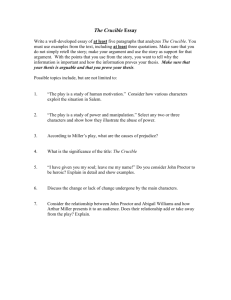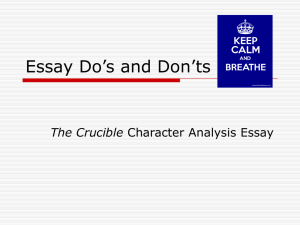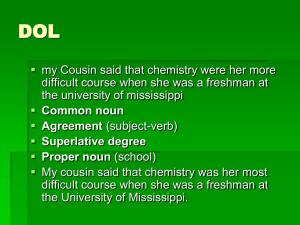Arthur Miller rhetorically chose to intertwine the events of the play
advertisement
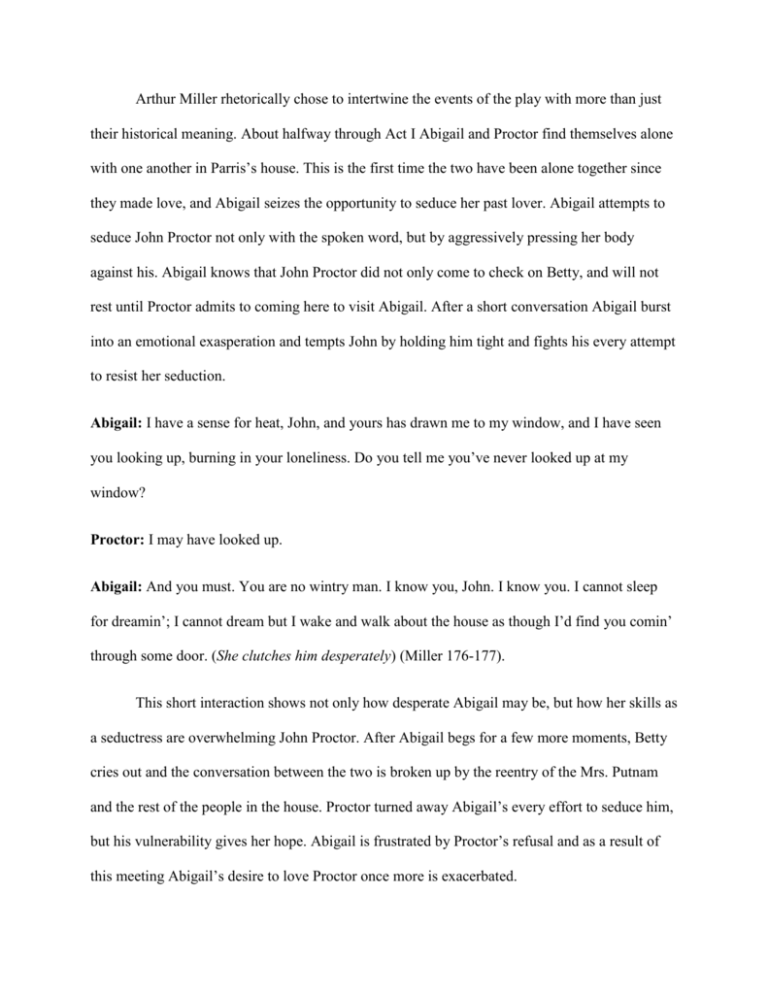
Arthur Miller rhetorically chose to intertwine the events of the play with more than just their historical meaning. About halfway through Act I Abigail and Proctor find themselves alone with one another in Parris’s house. This is the first time the two have been alone together since they made love, and Abigail seizes the opportunity to seduce her past lover. Abigail attempts to seduce John Proctor not only with the spoken word, but by aggressively pressing her body against his. Abigail knows that John Proctor did not only come to check on Betty, and will not rest until Proctor admits to coming here to visit Abigail. After a short conversation Abigail burst into an emotional exasperation and tempts John by holding him tight and fights his every attempt to resist her seduction. Abigail: I have a sense for heat, John, and yours has drawn me to my window, and I have seen you looking up, burning in your loneliness. Do you tell me you’ve never looked up at my window? Proctor: I may have looked up. Abigail: And you must. You are no wintry man. I know you, John. I know you. I cannot sleep for dreamin’; I cannot dream but I wake and walk about the house as though I’d find you comin’ through some door. (She clutches him desperately) (Miller 176-177). This short interaction shows not only how desperate Abigail may be, but how her skills as a seductress are overwhelming John Proctor. After Abigail begs for a few more moments, Betty cries out and the conversation between the two is broken up by the reentry of the Mrs. Putnam and the rest of the people in the house. Proctor turned away Abigail’s every effort to seduce him, but his vulnerability gives her hope. Abigail is frustrated by Proctor’s refusal and as a result of this meeting Abigail’s desire to love Proctor once more is exacerbated. At the end of Act II Abigail utilizes her seductive charm to protect her own well-being and the well-being of her friends. As the people of the town are becoming more and more hysteric due to the assumed presence of witchcraft in Salem. In the Puritan era there is a strict devotion to following the Church’s plan, and when it comes to explaining any entity that counters the Church, Puritans point the finger at the Devil. In this case, the people of Salem are distraught, and in their feverishness they are seeking an answer to all of their problems. Abigail finds herself in a dilemma, but she is more rhetorically equipped than her age may suggest. Abigail realizes that she was one of the main instigators of the madness in the woods, and in order save herself from the persecution of the entire town, she gives their outstretched fingers something to point at. Being a skilled rhetorician, Abigail plays the card of innocence. Abigail breaks down in front of Hale, Mr. and Mrs. Putnam, Proctor, Tituba, and Betty. She pleas her innocence, and attempts to convince the people witnessing her outcry she had no intentions of provoking harmful spirits. Abigail: I want to open myself! (She is enraptured, as though in a pearly light.) I want the light of God, I want the sweet love of Jesus! I danced for the Devil; I saw him; I wrote in his book; I go back to Jesus; I kiss His hand. I saw Sarah Good with the Devil! I saw Goody Osburn with the Devil! I saw Bridget Bishop with the Devil! (Miller 189). In the midst of this chaos the seemingly lifeless Betty rises from the bed where she lye and the two girls fervently call out the names of several other housewives in Salem. Putnam reacts by immediately calling the Marshalls and Paris is glad to have cast the Devil out of these children and is ready to pursue the other participants in the witchcraft. The reaction of the people was precisely Abigail’s intention. She used her understanding of how eagerly the townsfolk wanted something to point the finger at that she convincingly presented that substance. In addition, she saved herself form persecution by denouncing the Devil and utilizing the innocence of her age. The people of the town are instinctively going to believe here because she gives meaning to their hysteria. This event was not only designed by Miller to demonstrate the faults of Puritan ideologies, but it also can be closely related to the HUAC hearings in the 1950’s. The American government, spurred on by Joseph McCarthy, needed substance to their accusations of Communists in America, and thus when people came forth with supposed Communist supporters the American Government was quick to seize the accused Americans. At the beginning of Act II after Proctor returns home to his house he speaks with Elizabeth for a short while as she is preparing to go to bed. Moments before she goes to bed Hale shows up at Proctor’s door step. Hale does not know what to believe because he is an outsider. He goes to Proctor’s house because Proctor strikes him as true and he hopes to some explanation for all of the madness about the town. Hale expresses to Proctor that although he thinks highly of him, Proctor’s attendance at Church has not been flawless. Proctor refuses to allow Hale to assume Proctor practices with the Devil, but in order to prove his righteousness Hale wills Proctor to recite his Ten Commandments. Proctor recites nine out of the Ten Commandments verbatim, but is reeling for the Commandment when his wife helps him out by pointing out he left out the Commandment about adultery. This is not only ironic, but this fault also possesses a very interesting meaning. First of all, the irony of the omission of the “Adultery Commandment” is that John Proctor is an adulterer. While Elizabeth was bedridden by sickness, John Proctor began messing around with Abigail. The irony of all of this is that Proctor has convinced Elizabeth that he has learned his lesson from his past sins, but does not even recall the principle commandment pertaining to adultery. This not only is ironic, but implies possibly that Proctor has not learned his lesson. Proctor was still tempted by Abigail earlier, and perhaps he really has not learned his lesson for his deed sin. Proctor is a good man, but he is not without fault. Miller used this crucial omission to imply that there is truly a crack in John Proctor’s theological foundation. Shortly after Hale’s arrival Giles Corey, Francis, Cheever, and Herrick arrive at Proctor’s house. The men come to take Elizabeth to be tried in court. Proctor is in outrage, he knows for a fact his wife is no witch, but Giles’s and Francis’s wives were already taken and they were regarded as the brick and mortar of the church. During all of this confusion Cheever finds a poppet that Mary Warren had brought home from the Court. Cheever finds precisely what he was looking for when he notices the needle pushed into the stomach of the doll. Earlier in Court, Abigail had all of the sudden collapsed onto the floor of the Court room claiming that Elizabeth’s spirit had forced a pin into her stomach. Bewildered by this Proctor, Proctor tears the warrant for Elizabeth’s arrest but it is not enough to keep Herrick form taking her. This event was all brought on by the poppet and Mary Warren’s belief that she was doing the right thing. Miller uses Mary Warren as a vessel of Abigail’s sinister control. Mary Warren becomes involved in the Court of Salem because she believes that she may have some great role in the persecution of witches. Abigail, realizing Mary Warren is a servant of John Proctor’s, devises a plan to justify the arrest of Elizabeth Proctor. Abigail makes the poppet and purposely gives it to Mary Warren with a needle stuck in the stomach. Later that day, during a trial, Abigail bursts into pain claiming that Elizabeth Proctor forced a needle into her stomach and removes the needle she pricked herself with as proof. As with all of the other accusations Abigail had made the Court sought to arrest Elizabeth Proctor on account of witchcraft. This event as a whole demonstrates Abigail’s grip on the Court, but the poppet signifies and Mary Warren signify the many vessels through which Abigail’s vengeance is delivered. Miller uses this vessel to portray the irony of Mary Warren’s involvement in the Court. Mary believes she is acting righteously, when she is simply the vessel through which innocent lives have been condemned. As Elizabeth was being taken from his house, John Proctor swore to fall on the court like an ocean, and in Act III he did just that. Proctor implores the court to listen to his testimony because he knows that Abigail Williams is truly acting form vengeance rather than from righteousness. In the heat of the Courtroom Proctor is gaining ground in his argument against Abigail. Proctor has already accused her of being a whore, and although Elizabeth did not admit to it, Danforth perhaps believes his story in the slightest. Abigail’s persuasiveness is too much for the poor farmer, and despite his every effort she has the support of her entranced Girls. Abigail claims to see a yellow bird, and all the while Abigail and the Girls eyes are transfixed on the rafters of the Courtroom. When Abigail screams, the girls scream in sick unison. The Court is thrown into chaos and Abigail claims Mary Warren is controlling the bird with her wicked spirit. Mary Warren rises to her own defense, but every time she opens her mouth the Girls and Abigail mock her every word. Eventually Mary Warren collapses in agony, scuffles over to Abigail’s side, and repents to Abby saying she meant her no harm. As a result of this chaos, Proctor is seized by the Court, and the whole universe seems to have turned itself inside out. Miller makes the Courtroom scene the most chaotic and intense of any scene in the entire allegory. There are so many symbolic and meaningful events in the Courtroom, but perhaps the most important is the moment when Mary Warren denounces Proctor and returns to Abigail. The seductress Abby has created a safe house for not only her own protection, but the protection of her Girls as well. The safe house is a peculiar idea, but Miller uses it to represent Abigail’s grip over the Girls. Abigail leads the house and all of the girls behind her follow precisely in her footsteps because they dare not cross the one ensuring their protection from Persecution. Mary Warren is forced by Proctor to aid in his argument, and thus she steps out of Abby’s protection. Abigail reminds Mary of who was keeping her safe from persecution in the Courtroom, and Mary was not strong enough to break the connection she had with Abigail. Miller uses the safe house to show how corrupt the Salem trials have become. Mary Warren knows that Abigail really is the vengeful whore Proctor makes her out to be, but she instead chooses the side that is going to come out on top. Abigail has truly created a safe house, and if Proctor’s argument was not enough to disturb its fortitude then no other argument will destruct it. Mary Warren represents those in the United States that knew the only way to ensure their own safety was to seek shelter in the safe house. The people of the HUAC hearings had to expose five American’s that were Communists in order to declare themselves safe, but many people simply listed five people that had no affiliation with the Communists in order to save their own skin. Miller uses the chaos of the Courtroom to really demonstrate how horrific the HUAC hearings truly were, and how he thought many people simply chose the side that would still stand at the end of the day, rather than the side that was righteous. After being condemned to hang, John Proctor finds himself in the dungeon in Act IV. On the morning of his hanging Elizabeth is sent by Hale to talk to Proctor. Hale wishes Proctor confess himself to the court and save his life, but neither Elizabeth nor Hale’s efforts are enough. Elizabeth admits to Proctor that many people have confessed lies to save their well-being, but she is in no way capable of determining the fate of her husband. Proctor understands his wife, and despite his will to live, Proctor values one thing in his life and that is his name. Proctor could not live knowing that he lied and allowed the condemnation of innocent lives on his name. He refuses to confess a lie, and he thusly is hanged a good man. The scene in the dungeon is one so dark and malicious that Miller is truly experimenting with the cosmos and fate. Miller uses Proctor as a symbol of what is good in life. Proctor could not live knowing that he was the reason for the persecution of innocent lives, and thus he chose to die righteously. Miller portrays Elizabeth as a saintly figure, because she too knows what is good in the world, but she does not have the power to decide fates. Abigail assumes the ability to decide fates, and this ability is one that God and God alone possess. Miller also represents that even in the darkest and blackest dungeons of life, goodness may always prevail. Proctor stood for something that was bigger than just sin and repentance, he died for what is good in life, he died for life itself. Although it is never truly implied, it is possible that Miller uses Proctor as the messiah, the savior, the one who had to die to save us all. Whether one believes in Jesus, Moses, or any other messiah, John Proctor is Miller’s representation of this figure, for her died for life itself.

